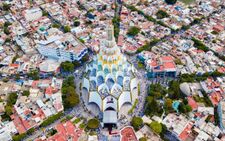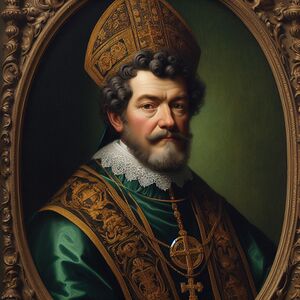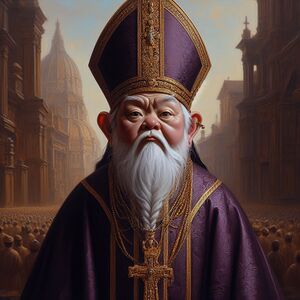Daxian Church of the East: Difference between revisions
mNo edit summary Tag: 2017 source edit |
mNo edit summary Tag: 2017 source edit |
||
| (6 intermediate revisions by the same user not shown) | |||
| Line 71: | Line 71: | ||
|logo = | |logo = | ||
|footnotes = }} | |footnotes = }} | ||
The '''Democratic Christian Church of Daxia and the East''' (Daxian: '''昆仑和东方民主基督教会''') is an independent Traditionalist Catholic denomination with its episcopal see in [[Daguo]], [[Daxia]]. Founded in 1644 by Deacon [[Quintulo Batiato]] (posthumously known as '''Pope Zosimus II'''). The Church does not recognize any of the [[Catholic Church]]'s popes after {{wp|Gregory XV}} and maintains that the Democratic Christian Church of Daxia and the East is the legitimate continuation of the papacy. | The '''Daxian Church of the East''' officially recognized by the Daxian government as the '''Democratic Christian Church of Daxia and the East''' (Daxian: '''昆仑和东方民主基督教会''') is an independent Traditionalist Catholic denomination with its episcopal see in [[Daguo]], [[Daxia]]. Founded in 1644 by Deacon [[Quintulo Batiato]] (posthumously known as '''Pope Zosimus II''') after his excommunication from the Catholic Church for calling on an ecumenical council to depose Pope {{wp|Urban VIII}} for supposed anti-Christian deviancies. The Church does not recognize any of the [[Catholic Church]]'s popes after {{wp|Gregory XV}} and maintains that the Democratic Christian Church of Daxia and the East is the legitimate continuation of the papacy. The Church is lightly overseen by the Directorate of Religious Affairs, an organ controlled by the government of [[Daxia]]. The Church functioned in a fully autonomous way for the first century of its existence, with most of its early Popes being foreign-born. In 1751 the Qian dynasty passed an Edict of Toleration which gave the church relief from certain fiscal restrictions and gave it some semblance of official protection, however the Edict also stipulated that the office of Pope would have to henceforth be occupied by a person of Daxian origin after the passing of the sitting pontiff. | ||
==History== | ==History== | ||
Christianity was first introduced to [[Daxia]] in 1623 by Acirian deacon Corso Pizarra and two Caphirian priests, Quintulo Batiato and Maximo Cosinga. Through their work at the Qian court they earned a modicum of toleration for their faith. The three men's competing egos would often get in the way of their proselytizing mission, with Batiato eventually sending letters to the Pope asking him to excommunicate his two companions. When this petition was denied and after being passed over for the newly created position of Bishop of [[Mirzak]] by {{wp|Urban VIII}} in favor of Cosinga, Batiato declared the throne of | ===Founding=== | ||
[[File:Pope Zosimus II.jpg|thumb|Founder of the Christian Church of the East, Pope Zosimus II. He is widely considered to be a schismatic and deviant antipope by the mainstream Catholic Church.]] | |||
Batiato decided then to form his own church to be the rightful successors of Saint Peter. He broke into Cosinga's church and stole the donations box and moved to the town of [[Daguo]] where he gathered a group of the | Christianity was first introduced to [[Daxia]] in 1623 by Acirian deacon Corso Pizarra and two Caphirian priests, Quintulo Batiato and Maximo Cosinga. Through their work at the Qian court they earned a modicum of toleration for their faith. The three men's competing egos would often get in the way of their proselytizing mission, with Batiato eventually sending letters to the Pope asking him to excommunicate his two companions. When this petition was denied and after being passed over for the newly created position of Bishop of [[Mirzak]] by {{wp|Urban VIII}} in favor of Cosinga, Batiato declared the throne of Saint Peter was vacant, due to Urban's 'Devil-induced insanity'. He sent letters to the College of Cardinals urging them to convene in session and elect a new pontiff, Church authorities responded in 1635 by branding him a heretic and excommunicating him. Batiato accused the College of Cardinals of 'being in the throes of sin' and decided then to form his own separate church to be the rightful successors of Saint Peter. He broke into Cosinga's church and stole the donations box and moved to the town of [[Daguo]] where he gathered a group of the dispossessed to be his acolytes. In 1637 he elevated himself to the rank of cardinal and would later create five more 'cardinals' from within the ranks of his acolytes. This new College of Cardinals unanimously elected Batiato as Pope whereupon he assumed the regnal name of Zosimus II of the Christian Church of the East. | ||
===Epoch of Occultation=== | |||
==Organization== | |||
===Papacy=== | |||
===Clergy=== | |||
===Headquarters=== | |||
==Traditions== | ==Traditions== | ||
==Popes== | ==List of Popes== | ||
*Popes Zosimus II, III, IV and V | *Popes Zosimus II, III, IV and V | ||
*Pope Homunculus | *Pope Homunculus | ||
Latest revision as of 03:56, 31 August 2024
Democratic Christian Church of Daxia and the East | |
|---|---|
| 昆仑和东方民主基督教会 | |
 Cathedral of St.Zosimus, Daguo | |
| Classification | Independent Catholicicism |
| Scripture | Bible |
| Theology | Catholic theology |
| Polity | Episcopal |
| Structure | Closed Communion |
| Pope | Zosimus V |
| Administration | Curia |
| Region | Daxia |
| Language | Ecclesiastical Latin and Daxian |
| Headquarters | Daguo, Daxia |
| Founder | Jesus Christ, according to sacred tradition |
| Origin | 17th century Daxia |
The Daxian Church of the East officially recognized by the Daxian government as the Democratic Christian Church of Daxia and the East (Daxian: 昆仑和东方民主基督教会) is an independent Traditionalist Catholic denomination with its episcopal see in Daguo, Daxia. Founded in 1644 by Deacon Quintulo Batiato (posthumously known as Pope Zosimus II) after his excommunication from the Catholic Church for calling on an ecumenical council to depose Pope Urban VIII for supposed anti-Christian deviancies. The Church does not recognize any of the Catholic Church's popes after Gregory XV and maintains that the Democratic Christian Church of Daxia and the East is the legitimate continuation of the papacy. The Church is lightly overseen by the Directorate of Religious Affairs, an organ controlled by the government of Daxia. The Church functioned in a fully autonomous way for the first century of its existence, with most of its early Popes being foreign-born. In 1751 the Qian dynasty passed an Edict of Toleration which gave the church relief from certain fiscal restrictions and gave it some semblance of official protection, however the Edict also stipulated that the office of Pope would have to henceforth be occupied by a person of Daxian origin after the passing of the sitting pontiff.
History
Founding

Christianity was first introduced to Daxia in 1623 by Acirian deacon Corso Pizarra and two Caphirian priests, Quintulo Batiato and Maximo Cosinga. Through their work at the Qian court they earned a modicum of toleration for their faith. The three men's competing egos would often get in the way of their proselytizing mission, with Batiato eventually sending letters to the Pope asking him to excommunicate his two companions. When this petition was denied and after being passed over for the newly created position of Bishop of Mirzak by Urban VIII in favor of Cosinga, Batiato declared the throne of Saint Peter was vacant, due to Urban's 'Devil-induced insanity'. He sent letters to the College of Cardinals urging them to convene in session and elect a new pontiff, Church authorities responded in 1635 by branding him a heretic and excommunicating him. Batiato accused the College of Cardinals of 'being in the throes of sin' and decided then to form his own separate church to be the rightful successors of Saint Peter. He broke into Cosinga's church and stole the donations box and moved to the town of Daguo where he gathered a group of the dispossessed to be his acolytes. In 1637 he elevated himself to the rank of cardinal and would later create five more 'cardinals' from within the ranks of his acolytes. This new College of Cardinals unanimously elected Batiato as Pope whereupon he assumed the regnal name of Zosimus II of the Christian Church of the East.
Epoch of Occultation
Organization
Papacy
Clergy
Headquarters
Traditions
List of Popes
- Popes Zosimus II, III, IV and V
- Pope Homunculus
- Pope Corpulentus
